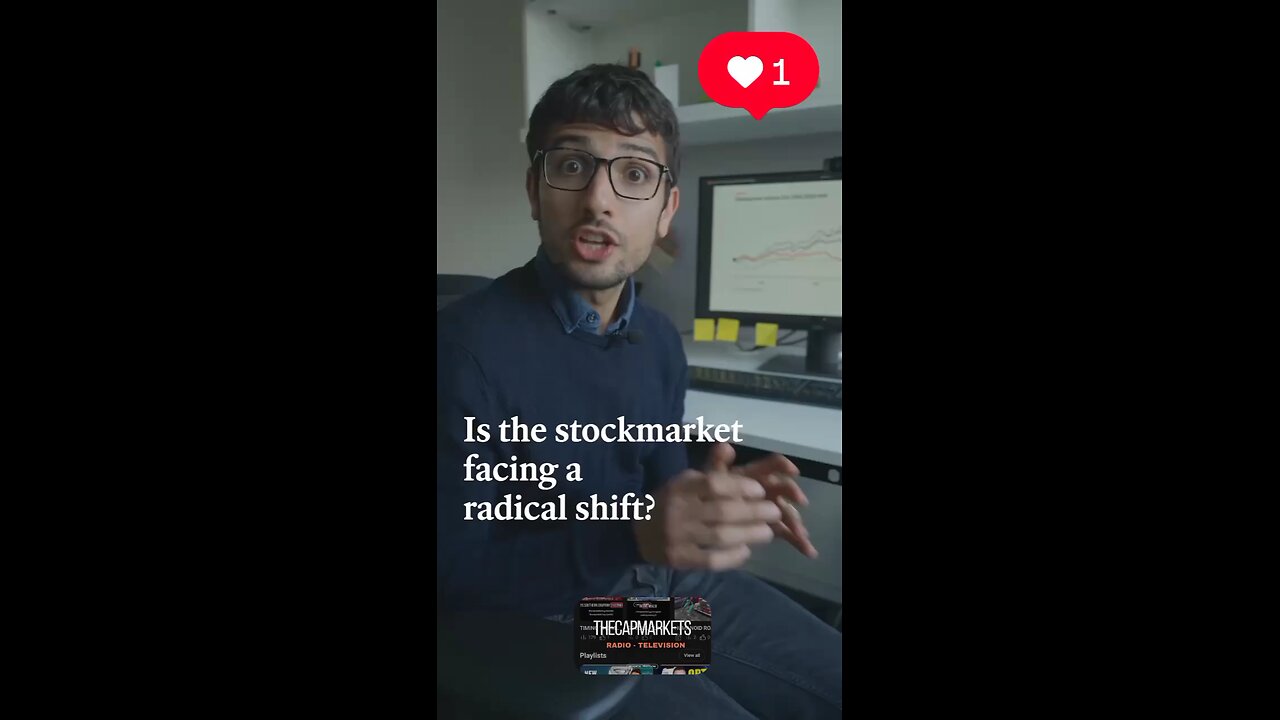Premium Only Content

STOCK MARKET IS FACING A RADICAL SHIFTING
The statement "the stock market is facing a radical shift" refers to major structural, technological, macroeconomic, and behavioral changes that are fundamentally transforming how markets operate, who participates, and what drives asset prices. Here’s an elaboration on the key forces behind this shift:
---
🧭 1. Macroeconomic Regime Shift
End of Zero/Low Interest Rates: After over a decade of near-zero rates, central banks have tightened aggressively (e.g., the Fed hiking to 5.25%+). This raises borrowing costs, compresses valuations, and alters investor behavior.
Return of Inflation Risk: Persistent inflation has made central banks more hawkish, shifting market focus from growth to inflation hedges and capital preservation.
De-globalization & Reshoring: Supply chain reconfiguration due to geopolitical tension (US-China decoupling, Russia-Ukraine war) has made markets more volatile and regionalized.
---
🔄 2. Tech-Led Market Transformation
AI and Automation Boom: The rise of generative AI (led by Nvidia, Microsoft, etc.) has shifted capital toward a few megacap tech names, creating an extremely narrow market rally.
Digital Asset Integration: Crypto and blockchain tech are being incorporated into traditional finance, changing investor portfolios and expectations.
Rise of Quant & Algo Trading: Over 60% of trading volume in the U.S. is now algorithmic, reducing human emotional bias but increasing flash-crash risks.
---
🌍 3. Changing Investor Demographics & Behavior
Retail Investor Power: The GameStop/AMC era showed how social media and commission-free trading platforms (e.g., Robinhood) empowered retail traders to move markets.
Shift to Passive Investing: Index funds and ETFs now dominate inflows, reducing demand for active management and distorting price discovery.
Generational Wealth Transfer: As Boomers retire and Gen Z/Millennials gain assets, ESG, tech-forward, and values-based investing grow in influence.
---
🧩 4. Market Structure and Asset Class Blending
Alternative Assets Going Mainstream: Real estate fractionalization, private equity access, and crypto ETFs blur the lines between public and private markets.
Options Market Dominance: Options trading volume now exceeds stock volume in many instances. Strategies like 0DTE (zero-days-to-expiry) are making markets more volatile and harder to predict.
---
⚠️ 5. Geopolitical and Regulatory Tensions
U.S.–China Tech War: The bifurcation of global tech standards is impacting global capital flows, semiconductor stocks, and cross-border investments.
More Active Regulation: Governments are targeting big tech (antitrust, AI ethics), climate regulation, and financial transparency — all of which affect earnings and valuations.
---
📊 Summary of the Radical Shift
Category Old Paradigm New Paradigm
Interest Rates Low for long Higher for longer
Market Leadership Broad-based Mega-cap tech-dominated
Investing Strategy Active stock picking Passive, thematic, or quant-driven
Retail Influence Marginal Material
Globalization Full integration Strategic decoupling
Risk Profile Low volatility High volatility, short-cycle trends
---
Would you like a visual chart or CSV that tracks ETFs or stocks most affected by this shift (e.g., AI, energy, defense, inflation hedges, etc.)?
--+++
Check out https://linktr.ee/thecapmarkets
for complete coverage along with all the latest financial news and data!
#investing #finance #moneytips #personalfinance #stockmarket
#invest #longterm #stock #money #bitcoin #financialfreedom #ipo #ai #ev
Disclaimer: Trading in financial markets involves significant risk, and there is no guarantee of profit. The information provided by any financial product or service is for educational purposes and should not be considered as financial advice. Before making any investment decisions, it's important to conduct thorough research and consult with a qualified financial advisor. Past performance is not indicative of future results. Always invest what you can afford to lose and be aware of the potential for loss in any investment strategy.
-
 54:56
54:56
Sarah Westall
2 hours agoHidden Biblical Writings: Evidence Based Investigation, Worlds First Collection w/ Matthew McWhorter
3.1K1 -
 LIVE
LIVE
megimu32
1 hour agoOTS: Great Scott! How Back to the Future Changed Movies Forever
129 watching -
 LIVE
LIVE
CassaiyanGaming
1 hour ago🟢LIVE - The OUTLAST Trials with JahBless & CatDog
51 watching -
 10:54
10:54
Nate The Lawyer
2 days ago $6.75 earnedNEW Charges & Lawsuit For Fake Doctor Illegal Who Ran Schools For Decades
17.6K20 -
 LIVE
LIVE
Joker Effect
1 hour agoSTREAMER NEWS: Adin Ross, LupLupka, SideScrollers, N3on, TrainwrecksTv, Cuffem, WestCol, BottedWTF.
429 watching -
 LIVE
LIVE
IsaiahLCarter
1 day ago $2.37 earnedWill New York City Choose Communism? || APOSTATE RADIO 032 (with John D. Macari)
157 watching -
 LIVE
LIVE
Illyes Jr Gaming
3 hours agoRetro Sports Game Night NHL 94
33 watching -
 LIVE
LIVE
HELMETFIRE
1 hour ago🟢GAMING WITH FIRE EP14🟢
14 watching -
 LIVE
LIVE
Damysus Gaming
1 hour agoBorderlands 4 -UVH Grinding and Farming With Amon
13 watching -
 25:47
25:47
Robbi On The Record
4 hours ago $2.14 earnedExposing the OnlyFans Industry (Agency Edition)
10.6K3